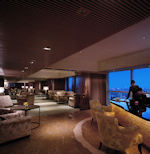Shangri-La Hotel, Beijing: Welcome to paradise – Christopher Chia
It was James Hilton's 1933 novel Lost Horizon that first inspired the naming and branding of Shangri-La Hotels - a fictional paradise designed to symbolise the values of serenity and subtlety the company has become famous for offering. After success in Singapore, the group opened its 670-room Beijing property in 1987, on land previously reserved for agricultural use. Since then, it has been a tremendous success, receiving over 130 awards during that time. This year alone it appeared in the Forbes Travel Guide and the gold list for Condé Nast Traveller in the UK and the US.
Part of this success lies in the hotel's location. Set apart from the congestion and pollution of central Beijing, the building is ideally placed just under 30 minutes from the main airport and right next to the central business district.
"We're very fortunate in terms of location," says Christopher Chia, general manager at Shangri-La Hotel, Beijing. "The traffic in Beijing is certainly a big challenge and we're situated just outside that. But we're still close to the financial district and the technology park - our version of Silicon Valley. That's ideal for any businessman flying to Beijing."
The hotel's setting also offers conference facilities that are attractive to event organisers. Arranging meetings for large groups of people in major, sprawling cities can be operationally challenging. But, because the Shangri-La Hotel, Beijing is situated away from the traffic jams, organisers can efficiently get their charges to the hotel.
"They like the exclusivity of our facilities," says Chia. "Due to the eclectic offerings of our hotel, there is really no need for our conference guest to brave the traffic to go elsewhere. Thus the organisers can keep everyone in one place and stick to a defined programme."
Beijing: culture cluster
People working in government and academia are also served by the cluster of major universities and administrative headquarters around the hotel. With transport links to the Great Wall, the Summer Palace and Beijing Zoo, the locational advantages apply just as equally to the hotel's many leisure travellers.
Guests that want to explore Chinese culture within the confines of the hotel will also find plenty to enjoy. The theme and décor of the building touches on traditional aspects of Chinese society, using a mystical cloud motif throughout.
"When you walk around the hotel, you experience these subtle aspects of Chinese culture," Chia explains. "It's built in a modern style, but it's also full of history and context. In the middle of the grand lobby lounge, we have a wonderful flower decoration and, through the tall glass, there are great views of the gardens."
Those gardens are another of the hotel's major attractions. The 3,000m² plot boasts a level of ecological maturity that most modern hotels can't hope to achieve. The garden landscape is helped along the way by the diversity of its flora, imposing Chinese pavilions and quaint koi pond.
"It's one of the benefits of having the plot of land that we do," Chia says. "As well as being a big hotel, we have a beautiful area for our guests to relax in and explore. It's also a very popular weekend space for special events such as wedding receptions."
The theme of luxury and serenity also applies to the hotel's spa, where guests can unwind and enjoy traditional Chinese and Asian massage treatment. That facility was added in 2007 along with the Valley Wing, a new hotel-within-a-hotel product - designed for heads of state and business leaders looking for added exclusivity, taste and hospitality.
"Normal hotels would have an executive floor, but we have an entire wing," Chia says. "The entire building has its own check-in and check-out section, private elevator, lounge and so forth. It's quite an exclusive product."
Appetites unleashed at Shangri-La Hotel, Beijing
All of Shangri-La Hotel, Beijing's guests can enjoy an array of culinary choices. The hotel has a Chinese and Japanese restaurant, as well as a coffee shop that serves Asian and Indian cuisine.
"It's a great all-day dining cafe," Chia says. "It's got Asian food cooked by a chef from Malaysia, and an Indian chef from Mumbai, who does wonderful curries, but we also cater for people who want pizza, pasta and burgers. We've got a Chinese chef, who specialises in dishes like Peking duck. It's the only coffee shop that sells Peking duck in the buffet - nobody else in town does that. Our guests have so many options in terms of dining.
That's great for business entertainment and travellers alike. They're both spoilt for choice."
S.T.A.Y. is the latest addition to the hotel's range of dining options. This new French-themed restaurant, created by Yannick Alleno, "mixes simplicity and modernity" in a way that creates a dining experience that is communal and interactive. Yannick, who's collected five Michelin stars in his previous two restaurants, offers a modern take on conventional French food and includes a communal table, a pastry library and a main dining room.
International service
With visitors coming in from all over the world, the ethnographical challenges of running an international hotel like the Shangri-La Hotel, Beijing can be deeply complex. The range of dining options goes some way to catering for the scope of cultural differences, and so does the attitude and commitment of the hotel's staff.
"The diversity is certainly a challenge, but it's one we look forward to," Chia says. "Whether it's a guest from China, Europe or the US, we understand and cater for the different needs and requirements of everyone. Our staff have made that challenge much easier over the years, and they are the reason why we've become one of the premier hotels in Beijing over the past 25 years."
Around a third of the hotel's staff have been with the Shangri-La Hotel, Beijing since it first opened. Their insight into its history, the way it operates and the expectations of its guests all contribute to its place as Beijing's top business hotel. That role is unlikely to diminish with new demand from inside China and a fresh round of investment set to shape future growth for the hotel.
"Our owners really understand the business and have no problem with investing in its upkeep and making expansions like the Valley Wing and S.T.A.Y.," Chia says. "We're really looking forward to the next step: the continuous upgrade of our property and maintaining the beauty of the Shangri-La Hotel, Beijing."


